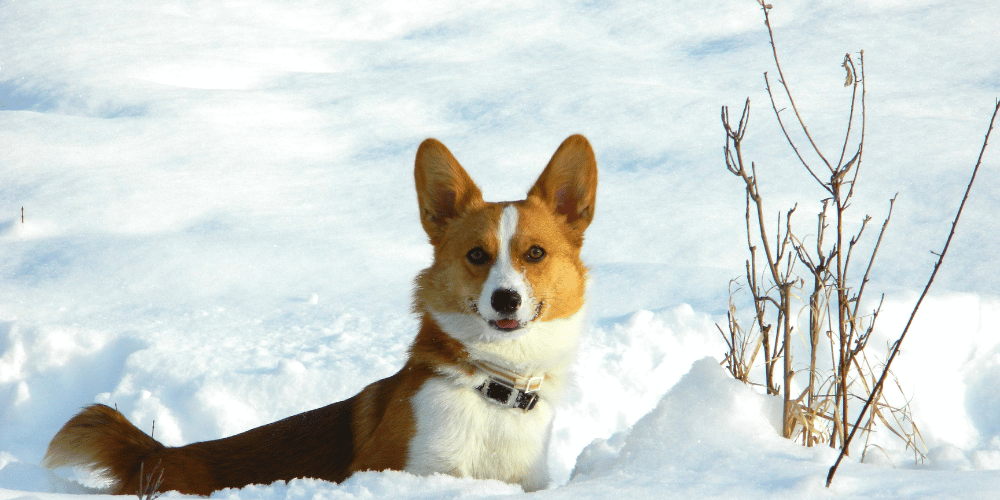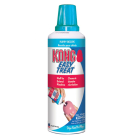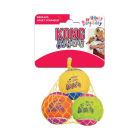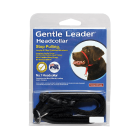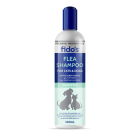As the temperatures begin to dip and summer tires are swapped for snow tires, it is also an excellent time to think about preparing your pets for the winter months ahead.
Grooming for Winter
Coat Care
Unless your pet is a breed that has a natural winter coat, you can help them prepare for the lower temperatures by keeping their coat well brushed. Removing the dead fur will allow new, thicker hair to grow. In addition, a well-groomed coat dries faster and is better at keeping your pet warm than a messy, matted coat.
Protect Their Paws
You should also trim the fur on your pet’s paws to stop the snow from sticking. Trim the hair between the pads short, but not too short! If your neighbourhood also salts their sidewalks, you may want to apply petroleum jelly to your pet’s paws before going for a walk. Make sure they don’t lick it off, and wipe their feet with a warm, damp towel as soon as you get home.
Some pets will tolerate wearing special booties to protect their feet from the colder weather. If your pet isn’t so sure, you can start by putting baby socks on their feet. Once they are used to the socks, you can try them with booties.
Coats and Clothing
Short-haired breeds and older or younger animals may also benefit from a coat or extra layers on those cold days. Putting a coat on your dog doesn’t mean you can leave them outside, though. If their coat or jacket gets wet, their body temperature can drop quickly, so remove any wet clothing immediately and bring your pet inside.
Look After Their Ears
If your pet loves to frolic in the snow, prevent ear infections from taking hold by drying their ears well with a warm towel after they have been outside.
Winter Dangers
Anti-freeze – Warning!
Wintertime brings some unique dangers to pets. Anti-freeze can be spilt or leaked from cars and has a sweet taste that can attract pets to drink it. It is highly toxic to pets, so make sure you clean up any spills and check your car regularly for leaks. Other anti-icing products used on sidewalks and windshields can also be toxic, so be extra cautious about what your pet is licking this winter.
Car Safety
Some outdoor animals and cats may seek the heat and protection of the engine bay of your car. Before you start the engine, bang on your hood or honk your horn a few times to give the animals a chance to escape before you turn on the moving parts that may injure them.
Keeping Up Your Fitness
If you still want to keep walking your dog despite the chilly weather, the longer hours of darkness in winter make it difficult to find time to walk in the sun. To keep yourself and your pet visible, wear clothing with reflective features or attach reflective accessories or a flashing light to yourself and your dog.
Toileting Tips
You should limit your pet's time outside to prevent them from developing frostbite or hypothermia. However, your dog may only be comfortable doing its business outside. To make it more comfortable for them, shovel an area for their use and a path in between. Stay close to them as it reassures them that you will let them back inside as soon as they finish. If your dog can be trained to go potty indoors, you can use puppy pee pads, an indoor grass mat or even teach them to use a litter box.
Caring For Animals That Want To Remain Outdoors
Shelter and Water
Some animals, such as feral cats, might not be so easily convinced to enter, even when the temperature drops below freezing. You can help make it easier for them to stay warm by providing them with an outdoor shelter. Plenty of guides online can help you build one if you cannot buy one. Ensuring they have access to clean, unfrozen water is also a priority, and it should be checked daily. Plastic water bowls are preferable to metal ones, as your pet could get its tongue stuck on a metal bowl.
Dogs that insist on being outside in all weather conditions will also need a cosy place to hide from the wind and snow. Keep the shelter off the ground by placing it on bricks or wood and cover the entrance with canvas or burlap to keep out the wind. Placing the shelter under the cover of a carport or porch or in a garage can provide extra protection from the elements.
Puppies, kittens, old cats, dogs, and ill animals should not be left outside for extended periods. Puppies and kittens cannot regulate their body heat when they are young. Older animals that have arthritis may suffer more in the winter, and sick animals should never be let outside.
Final Tips
Your pet will benefit from eating more in the winter as the extra calories help to keep them warm. If you are unsure how much extra to feed them, consult your veterinarian.
Ensure your pet has extra blankets and a warm bed to cosy up and enjoy those extra cuddles this winter!
